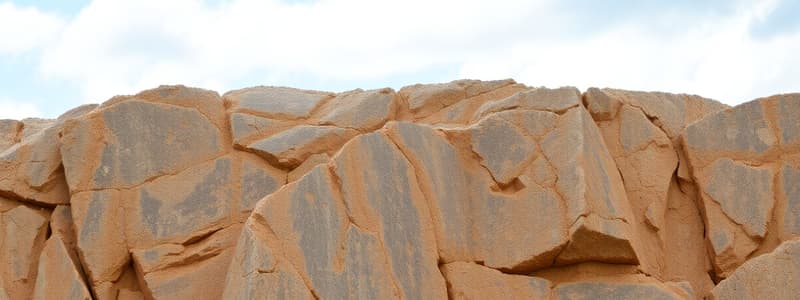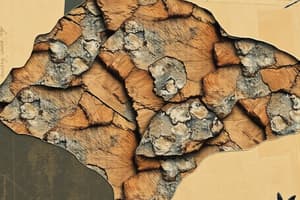Podcast
Questions and Answers
What is the main result of exfoliation?
What is the main result of exfoliation?
Which of the following parameters is NOT related to weathering or fractures in assessing rock-mass strength?
Which of the following parameters is NOT related to weathering or fractures in assessing rock-mass strength?
What does Rosin's law describe about fragments resulting from rock fracturing?
What does Rosin's law describe about fragments resulting from rock fracturing?
Which type of weathering involves a change in the chemical composition of rocks?
Which type of weathering involves a change in the chemical composition of rocks?
Signup and view all the answers
What describes the loose layer of fragments that covers much of Earth's surface?
What describes the loose layer of fragments that covers much of Earth's surface?
Signup and view all the answers
Which of the following processes does NOT constitute mechanical weathering?
Which of the following processes does NOT constitute mechanical weathering?
Signup and view all the answers
How does biological weathering primarily occur?
How does biological weathering primarily occur?
Signup and view all the answers
Which of the following descriptions best fits mechanical weathering?
Which of the following descriptions best fits mechanical weathering?
Signup and view all the answers
What is a primary effect of heating and cooling on rocks in desert conditions?
What is a primary effect of heating and cooling on rocks in desert conditions?
Signup and view all the answers
How does the presence of water influence the process of fire spalling in rocks?
How does the presence of water influence the process of fire spalling in rocks?
Signup and view all the answers
Which region is mentioned as experiencing more pronounced thermal effects due to extreme temperatures?
Which region is mentioned as experiencing more pronounced thermal effects due to extreme temperatures?
Signup and view all the answers
What factor is primarily responsible for the effective weathering of rocks during geological history?
What factor is primarily responsible for the effective weathering of rocks during geological history?
Signup and view all the answers
What is the typical temperature fluctuation range that can occur on desert ground surfaces?
What is the typical temperature fluctuation range that can occur on desert ground surfaces?
Signup and view all the answers
What is the maximum depth to which meteoric water circulates according to mineralogic studies?
What is the maximum depth to which meteoric water circulates according to mineralogic studies?
Signup and view all the answers
What is a primary factor that allows groundwater to circulate to depths of 10 to 20 km?
What is a primary factor that allows groundwater to circulate to depths of 10 to 20 km?
Signup and view all the answers
At what depths has water with isotopic composition of rainfall been found circulating around Eocene-age plutons in Idaho?
At what depths has water with isotopic composition of rainfall been found circulating around Eocene-age plutons in Idaho?
Signup and view all the answers
How does weathering differ from mass wasting and erosion?
How does weathering differ from mass wasting and erosion?
Signup and view all the answers
Which of the following processes is considered the precursor to mass wasting and erosion?
Which of the following processes is considered the precursor to mass wasting and erosion?
Signup and view all the answers
What happens to weathering processes once a rock fragment is dislodged?
What happens to weathering processes once a rock fragment is dislodged?
Signup and view all the answers
Which effect of weathering commonly results in the detachment of rock surfaces?
Which effect of weathering commonly results in the detachment of rock surfaces?
Signup and view all the answers
What is a key characteristic of weathering compared to other destructive processes?
What is a key characteristic of weathering compared to other destructive processes?
Signup and view all the answers
What is the percentage range of rock expansion upon pressure release?
What is the percentage range of rock expansion upon pressure release?
Signup and view all the answers
What type of joints are formed as a result of pressure release?
What type of joints are formed as a result of pressure release?
Signup and view all the answers
How deep do sheeting joints typically extend below the land surface?
How deep do sheeting joints typically extend below the land surface?
Signup and view all the answers
What geological formation in Switzerland demonstrates rapid denudation?
What geological formation in Switzerland demonstrates rapid denudation?
Signup and view all the answers
Why do sheeting joints develop only near the land surface?
Why do sheeting joints develop only near the land surface?
Signup and view all the answers
What is primarily determined by the spacing of faults and joints, other than sheeting?
What is primarily determined by the spacing of faults and joints, other than sheeting?
Signup and view all the answers
What does the shape of monolithic domes rely heavily on?
What does the shape of monolithic domes rely heavily on?
Signup and view all the answers
In glaciated mountains, how do sheeting joints appear on cirque walls?
In glaciated mountains, how do sheeting joints appear on cirque walls?
Signup and view all the answers
What plays a crucial role in the concentration of mineral dissolution during chemical weathering?
What plays a crucial role in the concentration of mineral dissolution during chemical weathering?
Signup and view all the answers
Which type of dissolution occurs when the components of a solid are equally soluble in solution?
Which type of dissolution occurs when the components of a solid are equally soluble in solution?
Signup and view all the answers
Which state of water is characterized by its high density and viscosity, making it immobile under gravity?
Which state of water is characterized by its high density and viscosity, making it immobile under gravity?
Signup and view all the answers
What effect does approaching equilibrium have on rapid chemical reactions involved in weathering?
What effect does approaching equilibrium have on rapid chemical reactions involved in weathering?
Signup and view all the answers
Which of the following accurately describes the state of water termed 'gravitational water'?
Which of the following accurately describes the state of water termed 'gravitational water'?
Signup and view all the answers
Which statement is true regarding chemical weathering processes?
Which statement is true regarding chemical weathering processes?
Signup and view all the answers
What is essential for enabling rapid chemical reactions during weathering?
What is essential for enabling rapid chemical reactions during weathering?
Signup and view all the answers
In which way does water facilitate the chemical weathering process?
In which way does water facilitate the chemical weathering process?
Signup and view all the answers
What is the primary function of formative elements in soil taxonomy?
What is the primary function of formative elements in soil taxonomy?
Signup and view all the answers
Which statement correctly describes the relationship between the terms 'Hapludalf', 'Udalf', and 'Alfisol'?
Which statement correctly describes the relationship between the terms 'Hapludalf', 'Udalf', and 'Alfisol'?
Signup and view all the answers
How many soil orders are defined in the soil taxonomy based on the horizon development?
How many soil orders are defined in the soil taxonomy based on the horizon development?
Signup and view all the answers
In the classification of soils, what does the term 'series' refer to?
In the classification of soils, what does the term 'series' refer to?
Signup and view all the answers
What does the formative element 'alf' signify in soil classification?
What does the formative element 'alf' signify in soil classification?
Signup and view all the answers
What characterizes the term 'Glossoboric' in the classified soil name?
What characterizes the term 'Glossoboric' in the classified soil name?
Signup and view all the answers
Which of the following best represents the components of a soil name in taxonomy?
Which of the following best represents the components of a soil name in taxonomy?
Signup and view all the answers
What is the significance of the suffix 'sol' in soil taxonomy?
What is the significance of the suffix 'sol' in soil taxonomy?
Signup and view all the answers
Study Notes
Weathering, Erosion & Soil Formation
- Earth's surface is constantly changing, with evidence of past changes seen throughout geological history.
- Different parts of Earth's surface are dominated by various geological agents with different working styles.
- Weathering is the process of rock disintegration and decomposition.
- Mechanical weathering involves physical processes like wind, rain, frost, and heat breaking rocks into smaller fragments.
- Chemical weathering is the decomposition of rocks and minerals by chemical and biochemical reactions.
- Biological weathering results from biological processes (e.g., plants, animals, humans), contributing to rock breakdown.
- Pressure release is a mechanical weathering process, where rocks expand upon exposure to surface conditions
- Exfoliation is the general term for the loosening or separation of concentric shells or layers of rocks.
- Frost cracking occurs due to freezing water expanding inside cracks, causing rocks to break.
- Certain minerals (e.g., pyrite) oxidize readily in certain chemical conditions. The resulting products are often of lower density than the original material, causing changes in rocks.
- Hydration pressure is often seen in the weathering process of certain clays.
- Abrasion is the gradual wearing down of bedrock by loose particles transported by wind, water, or ice.
- Temperature changes cause differential expansion in rocks, creating stresses that lead to disaggregation of mineral grains.
- Groundwater's presence can both facilitate weathering by transporting reactants and solutes, and by causing mechanical pressure, but also delay and reduce heating in some cases.
- Specific rock properties (e.g. permeability) have strong links to the number and interconnectedness of pores and fractures.
- The processes that alter rocks, not just physically but also chemically, are essential in geomorphic development.
- Weathering is a precursor to mass wasting and erosion.
- Weathering continues until a rock fragment is either dissolved, transformed, buried or submerged beyond atmospheric/ groundwater contact.
- Soil is made from the gradual breakdown and decomposition of rocks which are then mixed with various biological and inorganic materials.
- Soil is the loose, unconsolidated, or broken rock material present at the surface of the earth, whether from the weathering at that location or transported by water, glacial movement or wind.
- Soil horizons are zones of differing weathered material, roughly parallel to the ground's surface, created by soil-forming processes.
- Some key factors to soil formation are parent material, time, topography, climate, and organisms which all work simultaneously at different rates and depths beneath the earth's surface.
Soil properties
- Soil is a mixture of different sized minerals and biological materials like humus (partially decayed organic matter).
- Soil types are classified based on their chemical and physical properties. Agricultural practices and soil types can be linked.
- The five key horizons are O, A, E, B, and C (in order from surface to bedrock), each containing specific weathered material.
- Soil's horizons, often in layers, reflect the varying intensity and duration of soil-forming and weathering processes.
- Factors influencing soil formation include parent material, climate, organisms, topography, and time.
- Some key influences on soil are climate, parent material, organisms and topographic factors.
- Understanding soil structure is important in engineering and agricultural practices.
Products of Weathering
- Clay: Tiny mineral particles with properties mirroring clay minerals; often hydrous alumino-silicate minerals.
Soil Classification
- Various national schemes enable soil mapping for agriculture and land use.
- Modern classifications are based on observable chemical/physical properties of soil horizons.
- US Department of Agriculture's soil classification method of 1965 remains a globally significant standard.
Soil Health Card
- A programme designed to provide farmers with improved access to information relating to optimum fertilization applications for crop improvement. This initiative is by the Ministry of Agriculture and Farmers Welfare, Government of India.
Soil Taxonomy
- Soil taxonomy employs a hierarchical system of classification (orders, suborders, great groups, subgroups, families, and series) using Greek and Latin formative elements that are used for effective and broad classification. Soil type is a crucial factor in the selection and application of agricultural practices.
- Soil orders are based on the presence and degree of development of various horizons
Studying That Suits You
Use AI to generate personalized quizzes and flashcards to suit your learning preferences.
Related Documents
Description
Test your knowledge on the processes of weathering and their effects on rock mass strength. This quiz covers various types of weathering, the influence of temperature changes, and the parameters affecting rock fragmentation. Delve into the complexities of geology and enhance your understanding of Earth's dynamic systems.




